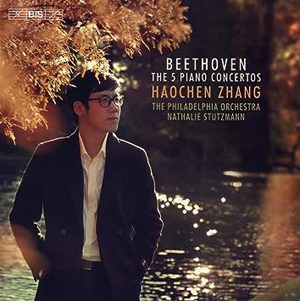Here’s a Beethoven Piano Concerto cycle that makes one listen to these ubiquitous works with fresh ears. More importantly, it does so without resorting to interpretive gimmicks or conceptual hooey. The Philadelphia Orchestra’s principal guest conductor Nathalie Stutzmann sets the stage for each work by way of energetic, vividly detailed ritornellos. The strings, of course, are leaner and less caloric than in their Eugene Ormandy heyday, yet they certainly sing. Stutzmann not only gives the woodwinds and brass their due, but also brings out a degree of linear interplay between orchestral strands from which one could conceivably take dictation.
One arresting example can be found in the C minor concerto’s Rondo, where the bassoon part almost but never quite upstages the solo oboist’s theme–they happily co-exist. At the same time, you’ll rarely hear such shapely left-hand counterpoint from the piano soloist. Both pianist Haochen Zhang and Stuzmann liberate the “Emperor” concerto’s outer movements from decades of accumulated pomposity, and what fun they must have had tossing the first-movement development section’s upward and downward scales back and forth.
The First concerto’s rabble-rousing Rondo caps a marvelous interpretation that defines what I call “serious fun”. No. 2’s hard-driving vigor and touching moments of lyrical respite evoke memories of the like-minded Glenn Gould/Leonard Bernstein recording, but with the advantage of state-of-the-art engineering. Those looking for an expansive and largely inward Fourth concerto in the manner of Arrau/Davis or Gilels/Ludwig may find our present protagonists a bit aggressive. Yet in the slow movement, I’m struck by the contrast between the strings’ stern militancy and Zhang’s plaintive restraint.
To both honor the score and imbue it with individuality and a genuine point of view is no easy task, yet Zhang’s enlivening pianism and Stutzmann’s stimulating leadership work wonders throughout these reference-worthy performances. Enthusiastically recommended.
































